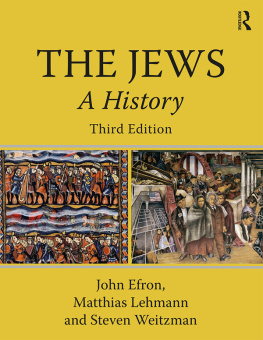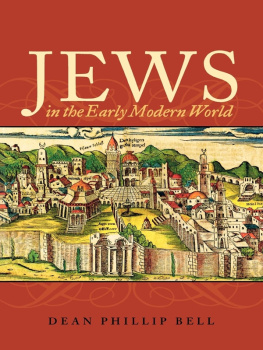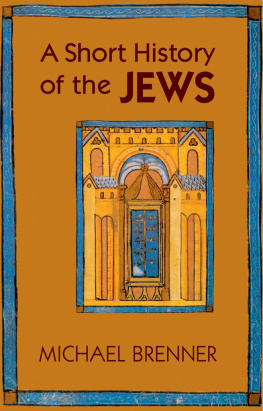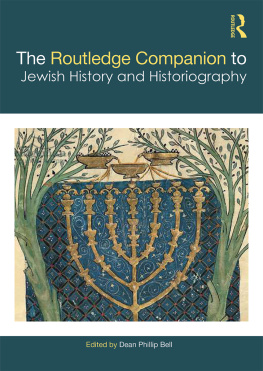T he authors wish to express their gratitude to several individuals whose behind-the-scenes efforts made this volume possible. Eve Setch, the editor who brought this project to Taylor and Francis, has been a wonderfully resilient champion, always remaining enthusiastic even in the face of formidable challenges that have surfaced along the way. We are grateful as well for the patience and attention to detail shown by her editorial assistant Zoe Thomson. We also wish to acknowledge the efforts of two others who were crucial to the process of making the book a reality: production editor Bonita Glanville-Morris and Sheri Sipka, project manager at Apex CoVantage. As we have moved from one edition to another, we have come to appreciate that there is much more to producing a text book than what its authors contribute, and we feel indebted to all those whose efforts have made the current edition possible.
Chapter 1
A NCIENT I SRAEL AND O THER A NCESTORS
J EWS HAVE LONG traced their origin to the Five Books of Moses in the Bible, to the story of Abraham and Sarah and their descendants, the Exodus from Egypt, and the revelation at Mount Sinai. We suspect that this is where many readers would expect a book like this to begin, and one has to admit that stories like those told in Genesis and Exodus make for a great opening, one of the most memorable origin stories ever told. But there is a complication that prevents us from beginning in this way.
Over the last few centuries, scholars have come to question the traditional account that traces the Jews back to the people and events described in the Bible, just as scientists came to question the Bibles explanation of how the world began, and they have developed many alternative reconstructions of ancient Jewish history, some directly at odds with the biblical account. Since our goal in this book is to share the fruits of modern historical research, should we not begin with these scholarly accounts? Perhaps, but scholars do not agree among themselves about how the Jews originated. They have been successful in raising doubts about the stories of Abraham, Moses, and Davidthanks to modern historical and archaeological research, we can no longer be certain that such figures even existedbut they have not settled on an alternative understanding of how the Jews originated. We have to struggle not only with how little we know about ancient Jewish history but also with how many possible ways there are to understand that history.
Consider how difficult it is to resolve when to begin Jewish history. Before we can begin recounting the history of the Jewish people, we must obviously decide when exactly to begin it, and it is not easy to commit oneself to a particular date or even a century as a starting point. As we have noted, Jews themselves have long believed their history begins with Abrahams sojourn to the land of Canaan and the Exodus from Egypt, but we do not know when these events occurred, if they occurred at all, and there are other problems as well. The people described in much of the Bible do not call themselves Jews, but Israelites, or the sons of Israel to be more precise, and their culture and religion differ from that of later Jews in many ways. Perhaps the beginning of Jewish history should be placed at the point at which the ancient Israelites become the Jews, but when exactly does that transformation take place? Many scholars place it at the end of the period described by the Hebrew Bible, in the wake of the Babylonian Exile in 586?BCE. Some place it even later, after the conquests of Alexander the Great in the fourth century BCE, and some still later, in the age of Roman rule and the ascendancy of Christianity. Depending on which account you happen to read, the story of the Jews begins 4,000 years ago in the Middle Bronze Age, or 2,000 years ago in the same age that produced Christianity, and some would go so far as to argue that we cannot really speak of the Jewsas opposed to the Israelites or the ancient Judeansuntil medieval or modern times.
Why is it so difficult to fix a clear starting point for Jewish history? One reason is that we simply do not have a lot of evidence for the earliest periods of Jewish history, but that is not the only complication. Another is that scholars do not agree about what Jewish means exactly and how it relates to or differs from overlapping terms used in the Bible, such as Israelite and Hebrew . The term Jew derives from the name Judah or Yehuda , but even in the Hebrew Bible that term has several possible meanings, referring to an Israelite tribe, to a territory in the southern part of Canaan, and also to the kingdom based in this territory and ruled by David and his descendants. After the end of the biblical period, the terms translated as Judean and Jewish acquired still other connotations, signifying a particular way of life or adherence to particular beliefs. The terms ambiguity continues to this day, with Jewish signifying a religion for some, for others a cultural or ethnic identity that may not be religious in orientation, and for still others a national identity, such as French, Turkish, or American. To fix a single starting point for Jewish history would commit us to a specific definition of Jewishness at the expense of other definitions that also have merit.
Still, we must begin somewhere, and this book has opted to begin where Jews themselves have long looked to understand their originswith history as described in the Hebrew Bible. We put the word history in quotes here because it is not clear that the biblical account corresponds to what counts as history for a historian, the past as it actually happened. Modern scholarship has expressed doubts about the Hebrew Bibles value as a historical document, questioning whether the people described in the Bible, such as Abraham and Moses, really existed and whether key events, such as the Exodus and the revelation at Mount Sinai, really occurred. The skepticism of scholars has alienated some Jews and Christians who believe in the Bible as an accurate account of how reality works, but the reasons for this skepticism cannot be dismissed out of hand if one is willing to approach the evidence with an open mind. Mindful of what modern scholarship has concluded about the Bible, one of our goals in this chapter is to open the question of what really happened, to ask whether the biblical account of Israels historyits stories of Abraham and his family, the Exodus from Egypt, Joshuas conquest of the land of Canaan, the rule of King Davidcorresponds to the past as reconstructed by historians and archaeologists.
Even as we question the biblical account, however, we will also try to provide a sense of how it tells the story of ancient Israel because, regardless of whether that story corresponds to what actually happened, it is crucial for understanding the development of Jewish culture. For one thing, Jewish culture did not suddenly appear one day; it evolved out of an earlier Israelite culture from which it inherited beliefs, practices, language(s), texts, and patterns of social organization. Why do Jews worship a God who they believe created the world? Why are Canaan and Jerusalem so central in Jewish culture? What are the origins of Jewish religious practices such as circumcision, resting on the Sabbath, and keeping kosher? Why is Hebrew such an important language in Jewish culture? These questions cannot be answered without referring to pre-Jewish Israelite culture, and biblical literature is our richest source for understanding that culture.
A second reason for beginning with the Bible is that the perception of the Bible as the starting point for Jewish history is a historical fact in its own right, and an important one for understanding Jewish identity. For the last 2,000 years at least, Jews have looked to the Hebrew Bible to understand who they are and how they are to behave. To this day, in fact, many Jews trace their lineage back to patriarchs such as Abraham and Jacob; during Passover, they recount the Exodus as if in Egypt themselves, and many look forward to the coming of a messiah from the line of King David. We are speaking here of religious Jews but even secularized JewsJews who are not animated by faith in God and do not see their identity as a religious onecan look to the Bible to understand themselves or draw on it as a source for poetry, art, and other forms of cultural expression. Even if the Bible had no value whatsoever as a historical source (and we will see that it actually has great value as such a source), it is important to know what it says about the past if only to understand how Jews throughout the centuries have seen themselves.









